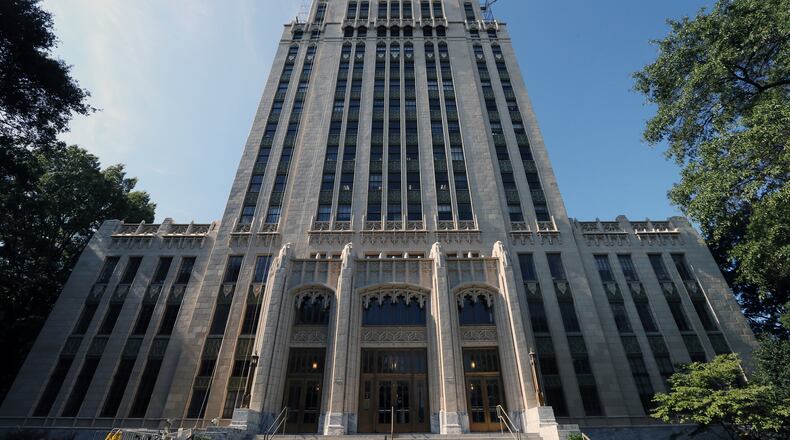For years, the committee that oversees the City of Atlanta’s independent auditor charged with making government more accountable, cost-effective and transparent has held its meetings in private without notifying the public or keeping records of what was discussed, in apparent violation of the Georgia Open Meetings Act.
That revelation surfaced during heated discussions about how the auditor and city’s ethics officer will function under the new Office of Inspector General, a position the city council is now attempting to establish to uncover and prevent corruption.
Mayor Keisha Lance Bottoms is pushing to give the new IG authority over the operations and staffs of the auditor and ethics officer — who see the effort as a threat to their independence.
“The Audit Committee must be independent, and continue to hold closed meetings to discuss sensitive financial matters without the interference of any outside influence,” Marion Cameron, chairwoman of the city’s audit board, wrote in a letter to the council earlier this week.
Late Wednesday, City Attorney Nina Hickson responded by arguing that the board is subject to the state’s open meetings law.
“Under no circumstances may the Audit Committee ‘hold closed meetings’ to discuss ‘sensitive financial matters,’” Hickson wrote.
Richard T. Griffiths, President Emeritus of Georgia First Amendment Foundation, said Hickson’s response absolutely “nailed it.”
“This is a sign that Nina Hickson is fighting for open and transparent government within the city,” Griffiths said.
For the past two years the city has endured a barrage of criticism for violations of the public records law. Last month, a former city spokeswoman became the first person to be criminally prosecuted and convicted under the Georgia Open Records Act.
“There is no doubt in my mind that [Cameron’s statement] demanded a rapid response,” Griffiths said.
The state’s sunshine laws dictate that the public must have access to governmental meetings and documents. The laws were created to ensure that the public’s business is conducted in a transparent manner so citizens can make informed decisions at the ballot box.
In specific instances, governmental bodies may retreat into closed sessions to discuss sensitive matters, such as litigation, real estate transactions or personnel decisions. Members must first take a public vote to hold a discussion behind closed doors.
“Financial matters of the city are generally matters of concern to the public and do not fall under any of the matters that are appropriately discussed in [closed door] executive session,” Hickson wrote.
City Auditor Amanda Noble told The Atlanta Journal-Constitution that a previous city attorney advised the Audit Committee that it was permitted to meet privately. Noble said she would work with city Transparency Officer Kristen Denius to ensure the committee’s meetings adhered to state law moving forward.
She said the committee meets five or six times year. Although the meetings follow agendas, the committee has not notified the public of the meetings or recorded minutes of what was discussed — two requirements under the Open Records Act.
A critical time for the city’s audit, ethics offices
The issue has come to light at a crucial time, as the City Council is considering placing the auditor’s office and the ethics officer under a new Office of Inspector General.
Noble, the auditor, said she didn’t understand why the city council was copied on the letter. In the past, Hickson has argued that legal advice is privileged communication that shouldn’t be shared.
A spokesman for Bottoms declined to comment, saying that the letter spoke for itself.
Under the charter, the audit committee is comprised of five individuals, one appointed by the mayor, another by the city council president and three others by the entire council. For the past decade, Noble said, former Mayor Kasim Reed and Bottoms have declined to appoint a representative.
Hickson's letter acknowledged that the city's charter specifically defines the audit committee as an independent management committee and not a public board. But Hickson referenced a statute that defined a public meeting as a gathering of a committee or governing body of an agency where official business, policy or public matter is discussed.
Atlanta city council members delayed voting Wednesday to establish the Inspector General's office. A council committee will debate the ordinance at a special called meeting Friday morning.
A multi-year federal investigation has resulted in guilty pleas and indictments of high-ranking bureaucrats and contractors. It has also added credibility to efforts in the Georgia General Assembly to put Hartsfield-Jackson International Airport under state control. City leaders hope a new Inspector General will demonstrate a serious commitment to ethical governance.
Former Mayor Shirley Franklin on Thursday told the AJC that she had a seat on the audit committee during her first term and then appointed a representative during her second term. The meetings were private then, she said.
“I don’t remember this being an issue,” Franklin said. “If it had been raised I probably would have supported them being open.”
About the Author
Keep Reading
The Latest
Featured



